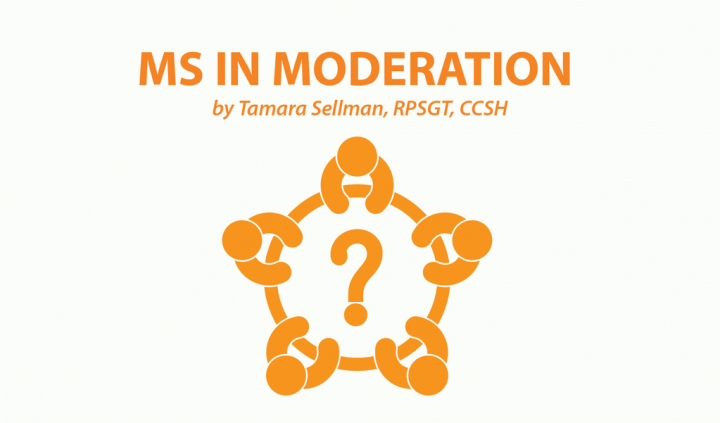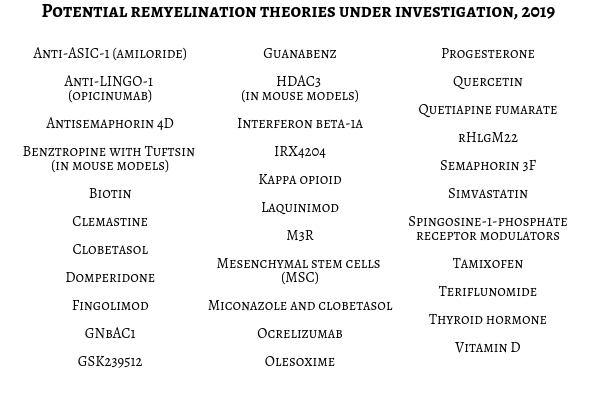Need to Know: What Is Remyelination?
Written by |


Editor’s note: “Need to Know” is a series inspired by common forum questions and comments from readers. Have a comment or question about MS? Visit our forum.
This week’s question is inspired by the forum topic “New MS Therapy Company to Focus on Rejuvenating Coating That Protects Nerve Cells” from April 11, 2018.
What is remyelination?
Multiple sclerosis (MS) can be defined as the demyelination, or erosion, of the myelin coating of central nervous system neurons by a rogue immune system. This impairs their function, reducing the speed and precision of nerve signal delivery. Messaging delays can cause problems including vision loss, muscle incoordination, incontinence, and speech pathologies.
Remyelination describes the repair of myelin. A healthy brain can replace lost or damaged myelin if given time and opportunity. But for someone with MS, disease progression interferes with these efforts.
Remyelination therapy basics
Why remyelination therapy?
No cure for MS exists. Treatments aim to halt progression and relieve symptoms. Disability remains an expected outcome.
Remyelination therapy, ideally, could offset progression and potentially reverse disability for some.
The authors of the study “Remyelination Therapy in Multiple Sclerosis,” published in the journal Frontiers in Neurology, state:
“Neuronal loss correlates highly with clinical disability, highlighting the need for treatments that promote neuronal survival in both relapsing and progressive forms of MS. Experimental models of MS … have shown that preservation of myelin and remyelination of axons can increase neuronal survival.”
Discuss the latest research in the MS News Today forums!
How does remyelination therapy work?
Remyelination can restore nerve function, prevent further damage, and reduce the risk for clinical disability. For example:
- Myelin regulation involves “running interference” for remyelination to take effect. Strategies include pharmacological modulation of signal pathways, cleaning up myelin debris, providing metabolic support for neurons, and inflammation control.
- Myelin repair and restoration enlists a “repair crew” to enter the neuron to patch or replace damaged myelin, restoring signal pathways so messages can be delivered without disruption in signal speed or quality.
- Improved measurement of remyelination in clinical trials can deliver proof of effective remyelination therapy.
Let’s take a closer look
Oligodendrocytes are responsible for the myelination of neurons. The process is dynamic, requiring these special cells to regulate myelin production in every neuron, then maintain it through oligodendrocyte progenitor cells (OPCs).
By themselves, neurons cannot regenerate independently, requiring OPCs to perform myelin repair.
Unfortunately, OPCs fail to perform in the brains of people with MS. Causes include lesion load, blood-brain barrier disruption, the presence of cytokines, and other processes. OPC deficiency may affect up to 40 percent of MS patients, according to research.
However, researchers have identified new partners in successful remyelination:
- Semaphorins: These “guidance molecules for axons” are the threadlike portions of neurons over which electrical signals are conducted. They influence OPC behaviors and may take action in remyelination.
- Astrocytes: When these are present, inflammation known as astrogliosis occurs in and around damaged areas. However, astrocytes also contribute to neuron repair by suppressing inflammation and protecting neurons through enzyme regulation.
- Gender and age factors: Remyelination can be affected by changes to cell structures due to age- and gender-related immune system changes. Women with MS remyelinate more efficiently than men.
What’s next in remyelination therapy?
- Remyelination substances currently under observation include the following (see Multiple Sclerosis Journal for details):

New imaging technologies are under development to measure remyelination efficacy, including:
- diffusion tensor imaging (DTI)
- magnetized transfer imaging (MTI)
- myelin water fraction imaging (MWF)
- positron emission tomography (PET)
The authors of “Remyelination in Multiple Sclerosis – How Close are We?” in the Journal of Neurology & Neurophysiology assert that:
“If we can provide our MS patients with drugs promoting remyelination, we will be changing the natural history of the disease. That is why it makes sense to think about this, as a much-needed therapeutic strategy.”
Remyelination therapy is not a cure, but can bring hope and maybe even a reversal of symptoms for many who are severely disabled by MS.
Does the prospect of remyelination therapy intrigue you? What questions do you have about this novel approach? Post your replies in the comments below or at the original “New MS Therapy Company to Focus on Rejuvenating Coating That Protects Nerve Cells” forum entry.
***
Note: Multiple Sclerosis News Today is strictly a news and information website about the disease. It does not provide medical advice, diagnosis, or treatment. This content is not intended to be a substitute for professional medical advice, diagnosis, or treatment. Always seek the advice of your physician or other qualified health provider with any questions you may have regarding a medical condition. Never disregard professional medical advice or delay in seeking it because of something you have read on this website. The opinions expressed in this column are not those of Multiple Sclerosis News Today or its parent company, Bionews Services, and are intended to spark discussion about issues pertaining to multiple sclerosis.



Charlotte Yeast
This is a very hopeful insight to people like me who have tried all the meds. Just would like or be so happy to see my MS stay where it is. I feel every step forward. Is actually. 20. Because something is learned. Thank you. Charlotte Yeast . Bardstown Kentucky
Tamara Sellman
I think you're right, even just a little bit of new information reveals so much we didn't know before about MS. I agree that remyelination is probably the next best thing to a cure.
Tamara
Raffaello
Rimielinizzare significa sconfiggere la sclerosi multipla
From Tamara: Translation to English -- "Remyelination means defeating multiple sclerosis"
In response to Raffaello, Sono d'accordo. C'è speranza! [I agree. There is hope!]
Jeri Ritenour
If this article is true it's great news for those of us with MS. Why does this treatment work better with females?
Tom Harrison
Anything new with NDC 1308?
Tamara Sellman
Not that I'm aware of, Tom. A quick search in the NIH database doesn't show any newer research than what occurred prior to 2018 (unless I'm searching wrong)
Tamara
Kristi Henderson
Remyelination therapy sounds AMAZING and makes sense to me! How does one get involved in trying this approach? Are there certain areas of the US that ARE using this therapy?
Tamara Sellman
I don't believe this treatment is available in the US, I think the FDA is waiting to see how it goes in Europe and, at least the rumor has it, will fast track it based on positive research outcomes. But I can't find anything that confirms this.
Tamara
Lisa A Hiatt
Hi im a little confused..is this saying possible med for secondary??
Tamara Sellman
Yes, for anybody. Remyelination should truly help those with progressive disease and severe disability the most.
Tamara
Karen Bludworth
I am very much interested in any trials regarding remylination. Diagnosed w/PPMS would love to see any progress
Tamara Sellman
I don't think there are any in the US, but a lot going on in Europe.
Tamara
Laura Cascante
Sounds promising for ms and other autoimmune diseases. I have NMO, very similar to ms. I would be happy to sign up for trials.
Tamara Sellman
Definitely keep your eyes open! I don't think there is anything on trial in the US yet, but that could soon change.
Tamara
Priscilla Rios
Why not a cure? To many of us remyelination would be a blessing. To know it's a possibility and plan for another child without thinking of the post pregnancy relapse...amen.
Tamara Sellman
I see remyelination being the next best thing to a cure. Very promising!
Tamara
Pat Kipf
Remyelination is the only real hope for curing MS
Tamara Sellman
The way I see it: A cure stops the disease in its tracks, but remyelination, while not doing this, can at least "run interference" and prevent future damage, and maybe even reverse previous damage. That would be awesome! Tamara
Stephanie Cannon
This article gives a lot of hope for the future of ms treatments. I would love to see more progress in this area. Not a cure, but what a life changer!
Tamara Sellman
Totally a life changer, glad you found hope in the message!
Tamara
Angela
Not a cure but anything, anything at all that has the potential to run interference with the progression and possibly reversing previous damage from this disease gives so many hope of getting their lives back. This news certainly gives me hope to have my life back.
Tamara Sellman
I hear you, Angela! Frankly, remyelination is as good as a cure, if you ask me! Let's keep fingers crossed!
Tamara
Alex
Remyelination would be amazing! I really hope we can figure out how to make it happen. Unfortunately, there is still so much about MS that isn’t fully elucidated, basically everything. What causes it? How does it operate? In a healthy person oligodendrocytes make myelin, but in people with ms they don’t appear to work and it’s been suggested that they might actually be helping the immune system attack it! It seems like finding out what causes the disease andfiguring out how it works is the first step towards developing a cure. There is a lot of exciting research going on, but for now i’ll keep taking my clemastine which doesn’t seem to do a damn thing lol
Tamara Sellman
Alex
You make some great points. I'd REALLLLLLLY like to know what actually causes MS. Even if it's a "perfect storm" of several causes. That is a mystery for this century, hope it is solved in our lifetimes!
Tamara